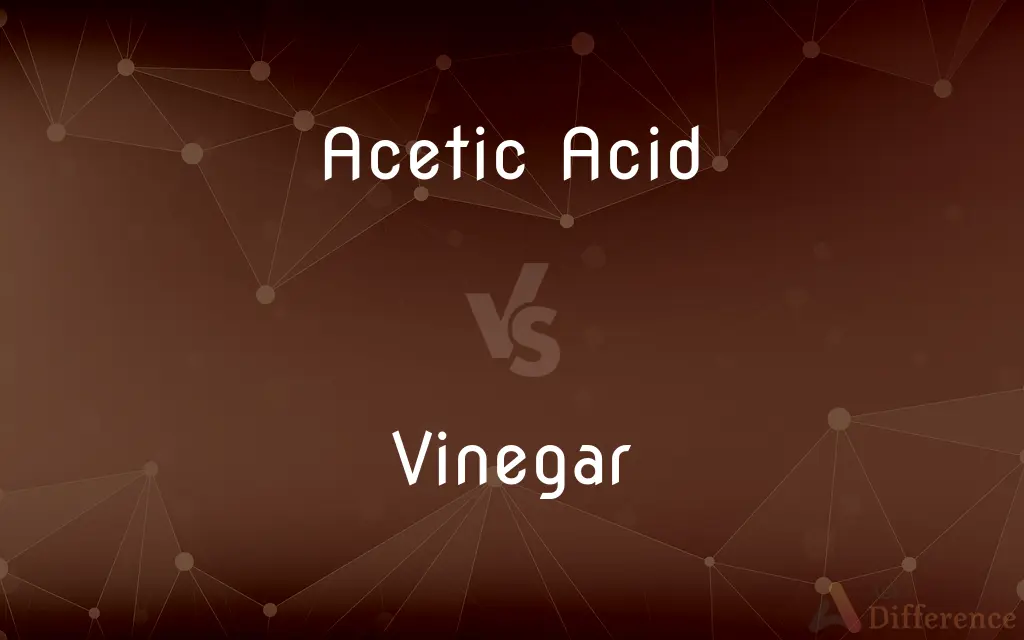Acetic Acid vs. Vinegar — What's the Difference?
By Tayyaba Rehman & Fiza Rafique — Published on October 31, 2023
Acetic Acid is a clear organic acid, while Vinegar is a liquid made from fermented ethanol containing 4-8% Acetic Acid.

Difference Between Acetic Acid and Vinegar
Table of Contents
ADVERTISEMENT
Key Differences
Acetic Acid is a colorless organic acid with a pungent smell, primarily used in the chemical industry. Vinegar, on the other hand, is a well-known household and culinary item produced by fermenting ethanol, where Acetic Acid is a primary component.
When discussing the chemical composition, Acetic Acid is a simple carboxylic acid with the formula CH₃COOH. In contrast, Vinegar contains between 4% and 8% Acetic Acid, with the remaining portion being water, trace chemicals, and flavor compounds.
For culinary purposes, pure Acetic Acid would be too strong and potentially harmful to consume. Vinegar, being diluted with other elements, is more versatile and can be used in cooking, salad dressings, pickling, and as a preservative due to the Acetic Acid content.
It's crucial to remember that while all Vinegar contains Acetic Acid, not all Acetic Acid is found in vinegar. Many industrial applications use Acetic Acid in manufacturing plastics, synthetic fibers, and food additives, among other products.
When one thinks of Acetic Acid, they might imagine a laboratory or industrial setting. In contrast, Vinegar, imbued with Acetic Acid, often evokes thoughts of kitchens, food, and home remedies, showcasing the different contexts in which they're commonly found.
ADVERTISEMENT
Comparison Chart
Composition
Pure organic acid
4-8% Acetic Acid, water, and flavor compounds
Use
Industrial, chemical processes
Culinary, cleaning, home remedies
Taste
Very strong, pungent
Sour with varying flavors depending on source material
Formula
CH₃COOH
Varies, with Acetic Acid as a key component
Context
Typically industrial or laboratory settings
Commonly found in kitchens and households
Compare with Definitions
Acetic Acid
Has the formula CH₃COOH.
In chemistry, Acetic Acid is recognized by its formula CH₃COOH.
Vinegar
Contains 4-8% Acetic Acid.
The sour taste of Vinegar comes from its Acetic Acid content.
Acetic Acid
An organic carboxylic acid.
The pungent smell in the lab was due to the spilled Acetic Acid.
Vinegar
A liquid from fermented ethanol.
She used Vinegar to add flavor to her salad dressing.
Acetic Acid
Main component in vinegar.
Vinegar gets its sour taste primarily from Acetic Acid.
Vinegar
Used in cooking and cleaning.
Apart from cooking, Vinegar can be used as a natural cleaning agent.
Acetic Acid
Used in industrial applications.
Acetic Acid plays a vital role in producing certain plastics.
Vinegar
Acts as a preservative due to Acetic Acid.
Pickles remain fresh because Vinegar acts as a preservative.
Acetic Acid
Strong and pungent in pure form.
It's essential to handle pure Acetic Acid with care due to its strength.
Vinegar
Has various types based on source material.
Apple cider Vinegar is derived from fermented apple juice.
Vinegar
A sour liquid containing acetic acid, produced by fermenting a solution (such as wine or fermented rice) containing ethanol produced by a previous fermentation, used as a condiment and preservative.
Vinegar
Sourness of speech or mood; ill temper.
Vinegar
Liveliness and enthusiasm; vim.
Vinegar
(uncountable) A sour liquid formed by the fermentation of alcohol used as a condiment or preservative; a dilute solution of acetic acid.
Vinegar
(countable) Any variety of vinegar.
A range of herb-flavoured vinegars
Vinegar
(transitive) To season or otherwise treat with vinegar.
Vinegar
A sour liquid used as a condiment, or as a preservative, and obtained by the spontaneous (acetous) fermentation, or by the artificial oxidation, of wine, cider, beer, or the like.
Vinegar
Hence, anything sour; - used also metaphorically.
Here's the challenge: . . . I warrant there's vinegar and pepper in't.
Vinegar
To convert into vinegar; to make like vinegar; to render sour or sharp.
Hoping that he hath vinegared his sensesAs he was bid.
Vinegar
Sour-tasting liquid produced usually by oxidation of the alcohol in wine or cider and used as a condiment or food preservative
Vinegar
Dilute acetic acid
Common Curiosities
Is Acetic Acid only found in Vinegar?
No, Acetic Acid has many industrial applications beyond just being in Vinegar.
Is it safe to consume pure Acetic Acid?
No, consuming pure Acetic Acid can be harmful; it's too strong and caustic.
Can Vinegar be used for purposes other than cooking?
Yes, Vinegar can also be used for cleaning, medicinal purposes, and as a preservative, among others.
Does all Vinegar have the same concentration of Acetic Acid?
No, different Vinegars have varying concentrations, but typically range from 4-8% Acetic Acid.
What happens when ethanol ferments?
When ethanol ferments, it produces Acetic Acid, which is the primary component in Vinegar.
Can Acetic Acid be used for cleaning like Vinegar?
While Acetic Acid has cleaning properties, pure Acetic Acid is too strong and should be handled with care, unlike household Vinegar.
What's the primary component that gives Vinegar its sour taste?
The primary component that gives Vinegar its sour taste is Acetic Acid.
How do the flavors of different Vinegars vary?
The flavors vary based on the source material and fermentation process, but all Vinegars contain Acetic Acid.
Can both Acetic Acid and Vinegar act as preservatives?
Yes, both Acetic Acid and Vinegar can act as preservatives, but Vinegar is more commonly used for culinary purposes.
Which is more potent, Acetic Acid or Vinegar?
Acetic Acid is more potent than Vinegar as Vinegar is essentially diluted Acetic Acid with other compounds.
Why is Vinegar a popular home remedy for certain ailments?
Vinegar, due to its Acetic Acid content, has antimicrobial properties, making it a popular home remedy.
In a laboratory setting, can Vinegar be used as a substitute for Acetic Acid?
While Vinegar contains Acetic Acid, it's not pure and typically isn't suitable for precise lab applications requiring Acetic Acid.
Why do some recipes call for Vinegar instead of pure Acetic Acid?
Recipes call for Vinegar because it adds flavor and is safer to consume than pure Acetic Acid.
Are there health benefits to consuming Vinegar?
Yes, some studies suggest that Vinegar, due to its Acetic Acid content, may have various health benefits.
How is the strength of Acetic Acid in Vinegar typically measured?
The strength of Acetic Acid in Vinegar is typically measured in terms of its percentage concentration.
Share Your Discovery

Previous Comparison
LCD TV vs. OLED TV
Next Comparison
Quicklime vs. Hydrated LimeAuthor Spotlight
Written by
Tayyaba RehmanTayyaba Rehman is a distinguished writer, currently serving as a primary contributor to askdifference.com. As a researcher in semantics and etymology, Tayyaba's passion for the complexity of languages and their distinctions has found a perfect home on the platform. Tayyaba delves into the intricacies of language, distinguishing between commonly confused words and phrases, thereby providing clarity for readers worldwide.
Co-written by
Fiza RafiqueFiza Rafique is a skilled content writer at AskDifference.com, where she meticulously refines and enhances written pieces. Drawing from her vast editorial expertise, Fiza ensures clarity, accuracy, and precision in every article. Passionate about language, she continually seeks to elevate the quality of content for readers worldwide.
















































